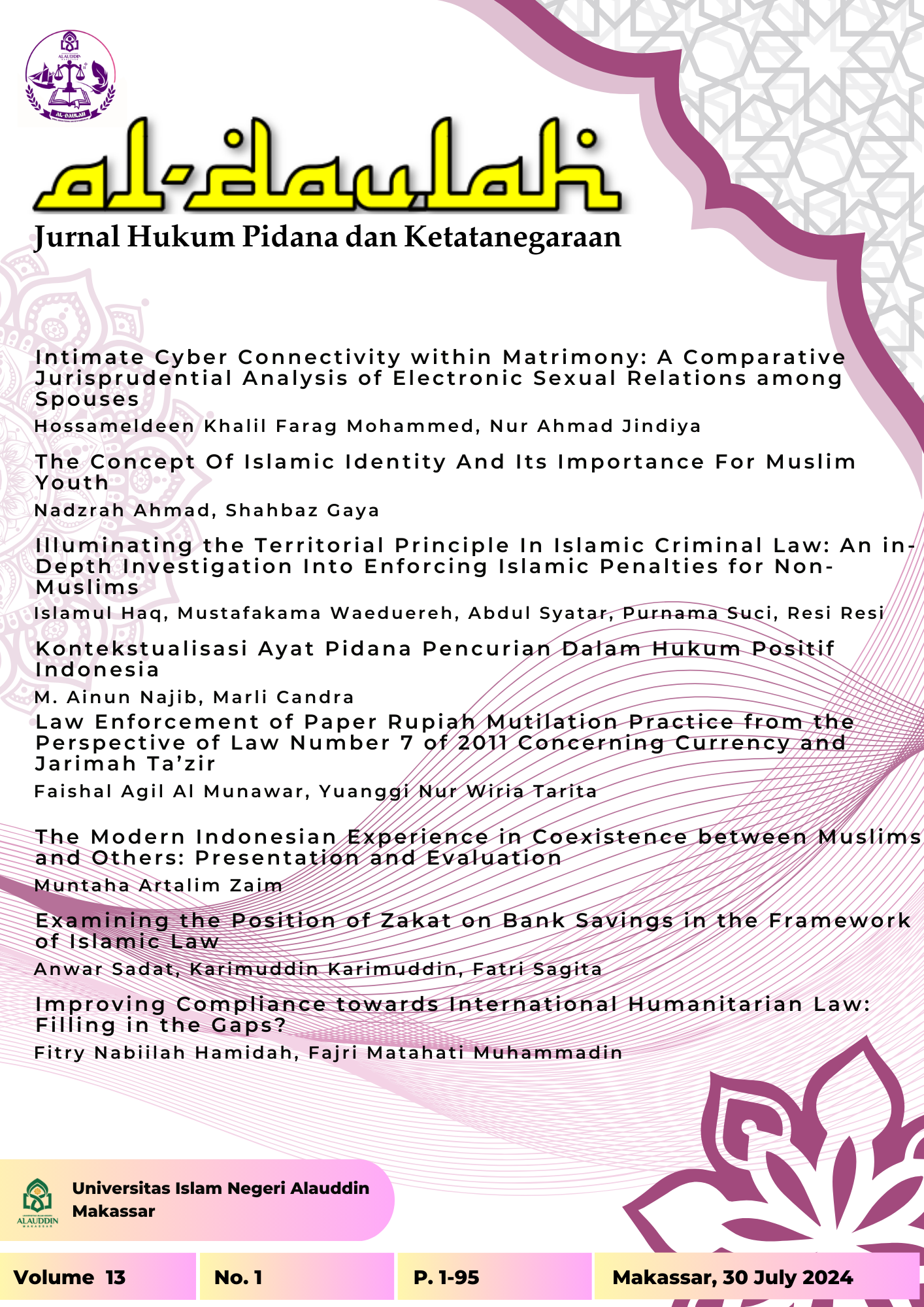Law Enforcement of Paper Rupiah Mutilation Practice from the Perspective of Law Number 7 of 2011 Concerning Currency and Jarimah Ta’zir
Abstract
The practice of mutilating paper currency notes is very dangerous. This practice not only damages the currency, but also attempts to counterfeit it. The emergence of this practice not only shakes economic stability, but also reflects the weakness of law enforcement. Law enforcement against this practice is still relatively weak. This research is an empirical juridical legal research with a legal sociology approach. Data sources consist of primary data and secondary data. The data collection method uses direct interviews, documentation, and literature study. The purpose of the research is to find out the law enforcement on the practice of mutilation of paper rupiah bills carried out by the Representative Office of Bank Indonesia Malang, as well as a review of the Currency Law and Islamic law, namely jarimah ta’zir. The results showed that the Representative Office of Bank Indonesia Malang is always proactive and aggressively conducts education, socialization, appeals, and cooperates with other law enforcement agencies. This practice according to Law Number 7 of 2011 concerning Currency has violated several articles, namely Article 25 Paragraph 1, Article 26 Paragraph 1, Article 35 Paragraph 1, Article 36 Paragraph 1, Article 38 paragraphs 1 and 2, Article 40 Paragraph 1, and Article 41 Paragraph 2 and if according to jarimah ta’zir, the Indonesian government applies ta’zir punishment in the form of imprisonment, fines, and additional punishment of revocation of business licenses or deprivation of certain goods.
References
Al-Mawardi, al-Bagdadi. Al-Ahkam Al-Sulthaniyah. Jakarta: Darul Falah, 2006.
Ashshofa, Burhan. Metode penelitian hukum. Jakarta: Rineka Cipta, 2004.
Ayuningrum, Retno. “Awas Uang Mutilasi Beredar! Ini Tips Agar Tak Tertipu.” detikjatim. Accessed February 5, 2024. https://www.detik.com/jatim/bisnis/d-6921672/awas-uang-mutilasi-beredar-ini-tips-agar-tak-tertipu.
Az-Zuhaili, Wahbah. Fiqih Islam Wa Adillatuhu Jilid 7. Gema Insani Press, 2011.
Bank Indonesia Regulation Number 21/10/PBI/2019 of 2019 concerning Rupiah Money Management.
Board of Governors Regulation Number 19/13/Padg/2017 on Rupiah Money Exchange.
Citranu. “Asas Legalitas Sebagai Pondasi Hukum Pidana Persfektif Filsafat Hukum.” Belom Bahadat 8, no. 1 (June 30, 2019). https://doi.org/10.33363/bb.v8i1.343.
Dewi, Margamu Desy Putri. “Faktor Penyebab Pengedaran Rupiah Palsu di Indonesia,” Adigama Law Journal, no. 4 (2021): 3792.
Harefa, Panca Gunawan, Idham, and Erniyanti. “Analisis Teori Hukum Terhadap Penegakan Tindak Pidana Pemalsuan Uang: Analisis Teori Hukum Positif dan Teori Hukum Responsif.” Scientific Journal of Law and Human Rights 2, no. 2 (March 1, 2023): 113–119. https://doi.org/10.35912/jihham.v2i2.1923.
Irfan, Muhammad Nurul. Hukum pidana Islam. First printing. Jakarta: Penerbit Amzah, 2016.
Latukau, Fikry, Deassy J.A. Hehanussa, and Erwin Ubwarin. “Penerapan Pasal 33 Ayat (2) Undang-Undang Nomor 7 Tahun 2011 Tentang Mata Uang di Maluku.” de Jure Scientific Journal of Legal Science 2, no. 1 (April 20, 2021): 54. https://doi.org/10.33387/dejure.v2i1.2955.
Law No. 7/2011 on Currency.
Yusuf, Muri. Metode Penelitian Kuantitatif, Kualitatif & Penelitian Gabungan. Prenada Media, 2016.
Muhammadun, Muzdalifah. “Konsep Kejahatan Dalam Al-Quran,” Diktum Law Journal, no.1 (2011): 24.
Munajat, Makhrus. Hukum pidana Islam di Indonesia. First Printing. Yogyakarta: Academic Affairs, UIN Sunan Kalijaga, 2008.
Nasution, Bahder Johan. Metode Penelitiuan Ilmu Hukum. CV. Mandar Maju, t.t.
Publishermp2. “Kepala Kantor Perwakilan Bank Indonesia Malang, Dikukuhkan Deputi Gubernur Senior Bank Indonesia.” Malang-Post.Com (blog), March 6, 2024, accessed on April 15, 2024 https://malang-post.com/2024/03/06/kepala-kantor-perwakilan-bank-indonesia-malang-dikukuhkan-deputi-gubernur-senior-bank-indonesia/.
Rays, H. M. Ikhwan. “Kajian Normatif Terhadap Kejahatan Pemalsuan Uang di Indonesia.” Yustisiabel Journal 3, no. 1 (April 30, 2019): 25–46. https://doi.org/10.32529/yustisiabel.v3i1.292.
Sonata, Depri Liber. “Metode Penelitian Hukum Normatif dan Empiris: Karakteristik Khas dari Metode Meneliti Hukum.” Fiat Justisia: Journal of Law Science 8, no. 1 (November 5, 2015). https://doi.org/10.25041/fiatjustisia.v8no1.283.
Vitto Andhika Putra, Faisal Alif Bima Saputra, Willy Wendy Fernando, Shafira Marsa, Rizky Karo Karo, and M. Naufal Shidqi Dhiyaulhaq. “Perkembangan Hukum Menanggapi Ancaman Perkembangan Teknologi Pada Pembuatan dan Peredaran Rupiah Palsu di Indonesia.” Journal of Lemhannas RI 10, no. 3 (October 9, 2022): 51–63. https://doi.org/10.55960/jlri.v10i3.297.
Copyright (c) 2024 Faishal Agil Al Munawar, Yuanggi Nur Wiria Tarita

This work is licensed under a Creative Commons Attribution 4.0 International License.
The authors of a work hold the copyright and grant the Al-Daulah: Jurnal Hukum Pidana dan Ketatanegaraan the right of first publication. The work is also licensed under the Creative Commons Attribution License (CC BY 4.0), which enables others to share the work while acknowledging the authorship and initial publication in the journal. The authors can make separate contractual agreements for the non-exclusive distribution of the published version of the work, such as by posting it to an institutional repository or editing it for a book, with an acknowledgment of its initial publication in this journal. Authors are allowed and encouraged to post their work online, such as in institutional repositories or on their website, before and during the submission process. This can lead to productive exchanges and greater citation of the published work.


